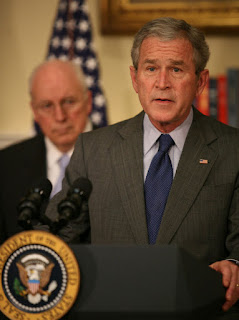 | forre el audio de la dirección de radio 1/19/08 por completo, transcripción del texto. (nota de los redactores: ninguna lengua española mp3 lanzó esta semana, apesadumbrada) PODCAST |
 y recibir la dirección de radio presidencial semanal en inglés y español con informes selectos del departamento del estado. Ofreciendo transcripciones audio y con texto completo verdaderas, más fuentes contentas agregaron a menudo así que la estancia templó.
y recibir la dirección de radio presidencial semanal en inglés y español con informes selectos del departamento del estado. Ofreciendo transcripciones audio y con texto completo verdaderas, más fuentes contentas agregaron a menudo así que la estancia templó.Buenos Días.
Ayer visité a Wright Manufacturing – un negocio en Frederick, Maryland que fabrica cortacéspedes comerciales. Los negocios como Wright son la fuerza motriz detrás de nuestro éxito económico. Crean empleos y oportunidades para millones de trabajadores. Y empresarios como aquellos en Wright Manufacturing mantienen creciendo a nuestra economía.
Este es un período de desafío para nuestra economía y sé que muchos de ustedes están preocupados en cuanto al futuro. Mis asesores y muchos expertos externos esperan que la economía siga creciendo en el próximo año, pero a una tasa más lenta que la que hemos gozado en los últimos años. Y hay el riesgo de una baja. Por ejemplo, si continúa la inestabilidad en el mercado de la vivienda, podría causar daño adicional a la economía en su conjunto, y poner en peligro a nuestro crecimiento y la creación de empleos.
En meses recientes, hemos tomado pasos para apuntalar el sector de la vivienda – incluyendo medidas para ayudar a dueños de casa con dificultades a evitar la ejecución hipotecaria y quedarse con sus hogares. También he pedido al Congreso que apruebe legislación para modernizar la Administración Federal de la Vivienda y permitirle ofrecer más ayuda a dueños de casa con dificultades. El Congreso debe enviarme sin demora un proyecto de ley con estas reformas.
Después de minuciosa consideración y discusión con miembros del Congreso, he llegado a la conclusión de que se necesita acción adicional para mantener creciendo a nuestra economía y crear empleos. El Congreso y mi Administración necesitan trabajar juntos para promulgar un paquete para el crecimiento económico lo más pronto posible.
Mientras el Congreso considera un tal plan, hay ciertos principios que deberán orientar sus deliberaciones: Este paquete de crecimiento debe ser lo suficientemente grande para hacer una diferencia en una economía tan grande y dinámica como la nuestra – lo que significa que deberá ser de aproximadamente un por ciento del Producto Nacional Bruto, o GDP por sus siglas en inglés. Este paquete de crecimiento deberá estar basado en un alivio tributario de base amplia que afecte directamente al crecimiento económico – no el tipo de proyectos de gastos que tendría poco impacto inmediato sobre nuestra economía. Este paquete de crecimiento debe ser provisional y ponerse en práctica inmediatamente – a fin de que podamos ayudar a nuestra economía cuando más lo necesita. Y este paquete de crecimiento no debe incluir ningún aumento en los impuestos.
Específicamente, este paquete de crecimiento deberá estimular tanto la inversión comercial como los gastos por consumidores, que son críticos para el crecimiento económico. Esto exige dos disposiciones claves: para ser efectivo, un paquete de crecimiento debe incluir incentivos tributarios para los negocios estadounidenses – incluyendo los pequeños negocios – para que inviertan en sus empresas este año. Y también debe incluir alivio del impuesto sobre los ingresos que sea directo y rápido para estadounidenses como ustedes.
El aprobar un nuevo paquete de crecimiento es nuestra prioridad económica más urgente. Y cuando se haya logrado, el Congreso deberá virar su atención a la prioridad económica más importante para nuestro país – la de asegurar que no se les quite el alivio tributario actualmente en efecto. A menos de que el Congreso actúe, la penalidad por matrimonio volverá a aparecer, el crédito tributario por hijo(a) menor será cortado por la mitad, el impuesto por defunción aparecerá de nuevo y subirán las tasas de los impuestos sobre el ingreso ordinario, las ganancias de capital y los dividendos. Este aumento en los impuestos pondría en riesgo los empleos y el crecimiento económico. De modo que es crítico que el Congreso haga permanente este alivio tributario.
Me siento optimista en cuanto a nuestra economía, ya que continuamente personas como ustedes han mostrado que los estadounidenses son las personas más trabajadoras, creativas y emprendedoras en el mundo. Es eso que ha hecho fuerte a nuestra economía. Y es eso que la hará más fuerte en los tiempos de desafío por delante.
Gracias por escuchar.
Para su publicación inmediata Oficina del Secretario de Prensa 19 de enero de 2008
Etiquetas De Technorati: Discurso Radial del Presidente a la Nación, y Presidente Bush or President Bush Discusses Economy, Growth Package VIDEO and Bessye J. Bearden and New nanostructured thin film shows promise for efficient solar energy conversion











